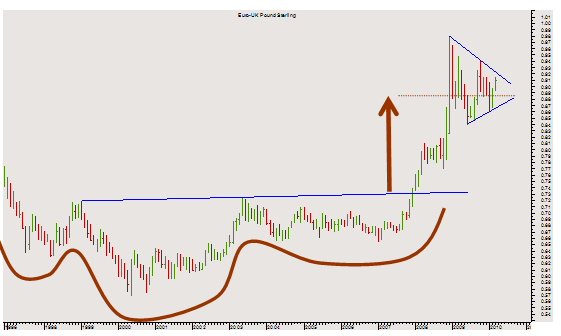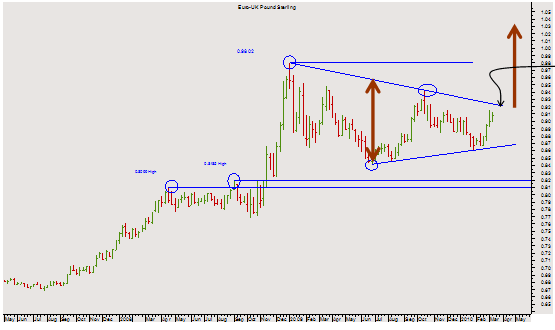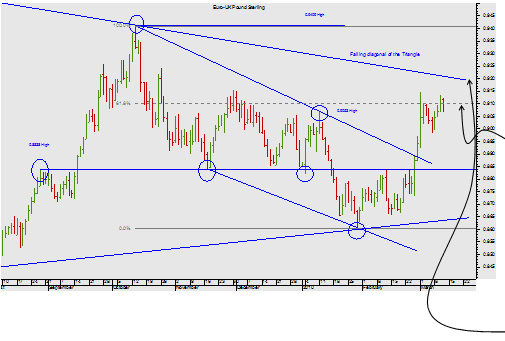Euro Sterling is Set to Go Further
Currencies / British Pound Mar 12, 2010 - 07:11 AM GMTBy: Seven_Days_Ahead
 The Euro has recently suffered a very pronounced period of weakness against both the US Dollar and the Japanese Yen but against Sterling it has remained strong throughout. Why is that?
The Euro has recently suffered a very pronounced period of weakness against both the US Dollar and the Japanese Yen but against Sterling it has remained strong throughout. Why is that?
The Technical Trader’s view:
 |
MONTHLY CHART The measured minimum move was up as far as 0.89. And there the market consolidated – it looks like a Triangle… look closer. |
|
WEEKLY CHART Were the market to break the upper boundary of the Triangle, a continuation pattern, the market would receive a huge bull impetus. The minimum move? Up as far as 1.04 or so. Might that happen? |
|
DAILY CHART There is a clear bull falling wedge which has completed. The market has shot ahead as far as the 61.8% Fibonacci retracement resistance - But the influence of the falling wedge suggests still higher levels – and a test of the diagonal at 0.920. If that were to break then a massive fresh injection of bull energy for the Euro would drive the Pound lower still towards that 1.04 target. |
The Macro Trader’s view:
First, let’s look at why the Euro came under such intense selling pressure. The main reason has been the well-publicized Greek Debt crisis, which also included Spain and Portugal but took less attention than events in Greece.
The main reason for Greece being in the spotlight was it was found to have lied about is public finances over a period of time with the express intention of gaining entry to the Euro. So although other peripheral Euro zone members have public finances in a similar sorry state, the markets picked on Greece because there was no confidence that even after the lies were admitted the data was believable.
Leading from this came the fear, which spread throughout markets, that a major economy might default on its Sovereign debt. Apart from Greece et al, the US and UK are running similarly large deficits and this too alarmed traders.
Fears receded after Greece agreed to take tough measures to improve its fiscal position with the EU/Euro zone pledging unspecified help. More recently, a European version of the IMF has been proposed, dubbed the “EMF” to deal with any future crisis. But the German leader has warned that Treaty amendments will be required to bring such an institution into being and the Bundesbank president has come out strongly against it.
That’s the story behind the Euro’s weakness, so one needs to look at the UK to see why Sterling alone failed to benefit from the Euro’s recent woes.
It is well documented that the UK economy was later to emerge from recession when compared to other G7 economies. Moreover the UK finances although not materially worse than others, has deteriorated much faster than other G7 economies. And with an election looming and the Government looking unpopular, Prime Minister Brown is reluctant to begin an orderly withdrawal of the stimulus.
His finance minister has set out a timetable to halve the deficit over 4 years, but the route looks unconvincing, making the pledge look less like a commitment than an aspiration. Indeed, despite apparently intending to cut the deficit, Brown keeps on trotting out more plans requiring additional public spending.
Add in the means so far put forward for bridging the Spend/Borrow gap; higher taxation, with the introduction of a new 50p band that has made many high earners think again about working in the UK and the landscape post election should Labour remain in office starts to look unfriendly towards business, or anyone that creates wealth either for themselves and the economy generally.
The rating agencies are unhappy with the current policy mix and periodically warn public finances must improve for the UK to keep its AAA credit rating, loss of which would force up the cost of funding the now large national debt.
So to recap Sterling’s position:
- Recovery underway, but Prime Minister and Central Bank warn it will likely be weak,
- Stimulus in place with no credible route for removing it,
- Political stalemate pointing to a hung Parliament with no party winning an overall majority,
- Likely outcome; difficult to gain agreement on sorting out the fiscal mess and how best to achieve it.
And recent data hasn’t helped. This week has seen a terrible set of trade figures. Usually a weak currency over a prolonged period corrects a large trade deficit. Not so in the UK, which means manufacturing is too weak and too small to satisfy even current reduced demand. This was confirmed again this week by a very disappointing set of industrial production and manufacturing output releases which bode badly for Q1 GDP due middle of next month.
So why has Sterling performed so poorly against the Euro despite all of the Euro’s ills? It is because the UK economy is weak by comparison and a political deadlock looks set to emerge after the May/June elections meaning little hope of any meaningful improvement.
The Pound looks weak.
Mark Sturdy
John Lewis
Seven Days Ahead
Be sure to sign up for and receive these articles automatically at Market Updates
Mark Sturdy, John Lewis & Philip Allwright, write exclusively for Seven Days Ahead a regulated financial advisor selling professional-level technical and macro analysis and high-performing trade recommendations with detailed risk control for banks, hedge funds, and expert private investors around the world. Check out our subscriptions.
© 2010 Copyright Seven Days Ahead - All Rights Reserved
Disclaimer: The above is a matter of opinion provided for general information purposes only and is not intended as investment advice. Information and analysis above are derived from sources and utilising methods believed to be reliable, but we cannot accept responsibility for any losses you may incur as a result of this analysis. Individuals should consult with their personal financial advisors.
Seven Days Ahead Archive |
© 2005-2022 http://www.MarketOracle.co.uk - The Market Oracle is a FREE Daily Financial Markets Analysis & Forecasting online publication.





